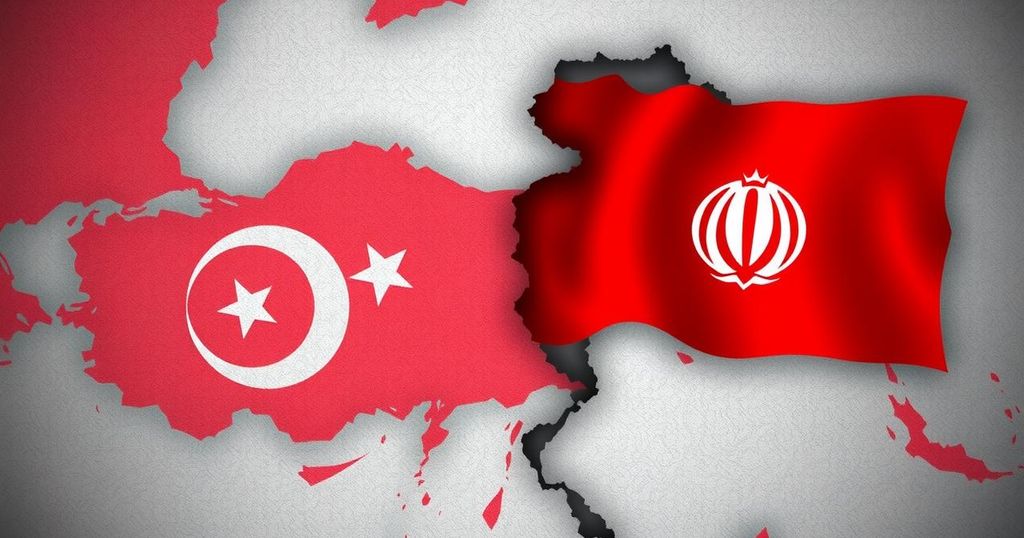Turkey Expands Media Presence with Launch of Persian News Service
On December 18, Turkey launched TRT Farsi, a Persian-language service aimed at expanding its media influence amidst strained relations with Iran. The initiative seeks to provide an alternative to prevalent Western narratives, encouraging cultural connections while addressing regional conflicts. Despite prior contentious remarks, Turkish officials emphasized the power of shared heritage and the importance of fostering communication with Persian speakers.
On December 18, Turkey’s state television, TRT, inaugurated its Persian-language service, TRT Farsi, marking a strategic expansion in its international broadcasting efforts. This initiative arises amid heightened tensions with Iran and is seen as part of Turkey’s broader strategy to challenge the predominant narratives found in Western media while enhancing its cultural and political influence in a region traditionally influenced by various foreign media outlets, such as BBC Persian and Iran International.
During the launch ceremony in Ankara, Fahrettin Altun, head of Turkey’s Presidential Communications Directorate, stated, “TRT has become a centre of attraction in the media sphere. Without a doubt, publishing content in Persian is a valuable service to humanity.” He emphasized the enduring cultural connections between Turkey and Iran, referencing the literary contributions of Persian poets and thinkers as reminders of their shared heritage.
TRT Director General Mehmet Zahid Sobaci articulated the network’s commitment to countering what he described as the Western media monoculture. “For years, international media was dominated by a one-sided, Western-centric view. Turkey, under President Erdogan’s leadership, has challenged this monopoly,” he declared. Sobaci drew a parallel between ongoing conflicts in Syria and Gaza, asserting that as oppression escalates, so too does the pursuit of justice.
This launch occurs against a backdrop of shifting geopolitical dynamics, particularly following recent developments in Syria, which have strained Tehran-Ankara relations. Sobaci’s previous comments suggesting the channel’s intention to “disturb Iran” fueled controversy and criticism from Iranian media representatives and analysts in Turkey. However, at the launch, Sobaci adopted a more diplomatic tone, stating that TRT Persian aims to foster greater understanding and communication between Turkish and Persian speakers.
The implications of this media initiative are compounded by comments made by Turkish Foreign Minister Hakan Fidan, who suggested that Iran could learn from Syria’s political situation. This remark has been met with sharp reproach from Iranian media, illustrating the sensitive nature of regional relations at this time. Currently, TRT operates across multiple languages, providing extensive content to a global audience, with reach reported at over 130 million Persian speakers.
This launch represents a significant move for Turkey as it strives to enhance its visibility in international media and navigate complex regional dynamics with Iran.
The newly launched TRT Farsi service is part of Turkey’s effort to extend its global media influence, particularly in the Persian-speaking regions, amid historically complex ties with Iran. TRT’s expansion into Persian-language broadcasting aims to contest Western media narratives while providing content reflective of Turkey’s perspective on current regional issues, such as the conflicts in Syria and Gaza, which resonate deeply with both Turkish and Persian audiences. The timing of this launch is notably sensitive, given the evolving political landscape in the Middle East, illustrating Turkey’s intent to engage more directly with its cultural and geopolitical neighbors.
Turkey’s launch of the TRT Farsi service signifies a calculated effort to enhance its media presence and cultural relations with Persian-speaking regions, particularly in the context of geopolitical tensions with Iran. By aiming to provide an alternative narrative to the largely Western-dominated media landscape, Turkey seeks to reinforce historical cultural ties while simultaneously addressing contemporary regional conflicts. The reception of this initiative, however, remains complicated by ongoing political dynamics and prior controversial statements from Turkish officials.
Original Source: www.intellinews.com




Post Comment